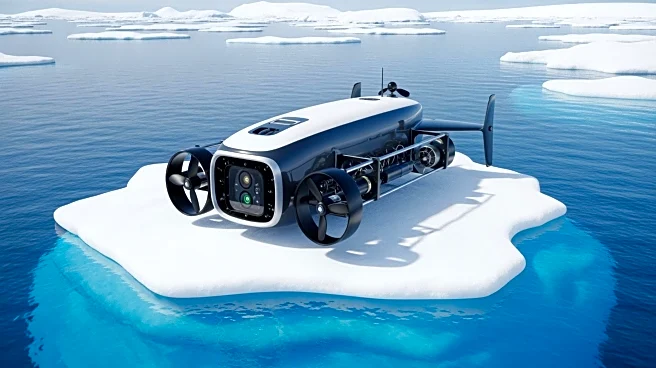What's Happening?
The University of Gothenburg has announced the acquisition of a new underwater vehicle, the HUGIN autonomous underwater vehicle (AUV), to replace its previous model, 'Ran,' which was lost under an Antarctic glacier in 2024. This purchase is made possible
through a major donation from Voice of the Ocean and insurance funds. The new vehicle, named 'Ran II,' will enhance the university's research capabilities in Antarctica, allowing for continued exploration beneath glaciers and sea ice. The HUGIN AUV is equipped with high-resolution sensors and a 3000-meter range, enabling it to access areas that are unreachable by ships. It will provide comprehensive geophysical data by measuring topography, currents, and water properties simultaneously. The vehicle's improved navigation and emergency decision support systems will increase safety and precision in challenging environments.
Why It's Important?
The acquisition of the HUGIN AUV is significant for the University of Gothenburg's research efforts in understanding the mechanisms driving ice melt in Antarctica. This research is crucial for global climate studies, as the melting of Antarctic glaciers contributes to rising sea levels. The enhanced capabilities of 'Ran II' will allow researchers to gather more detailed data, potentially leading to new insights into climate change and its impacts. The ability to explore hard-to-reach areas beneath glaciers and sea ice will provide valuable information that satellite data alone cannot offer. This development underscores the importance of technological advancements in environmental research and the role of autonomous vehicles in expanding scientific knowledge.
What's Next?
With the acquisition of 'Ran II,' the University of Gothenburg plans to resume its Antarctic expeditions, focusing on areas previously inaccessible. Researchers will aim to gather data that could inform global climate models and contribute to the understanding of ice dynamics. The university may collaborate with other institutions to maximize the use of the new vehicle's capabilities. As the research progresses, findings could influence policy decisions related to climate change mitigation and adaptation strategies. The continued support from donors and insurance funds will be crucial in sustaining these efforts.
Beyond the Headlines
The use of autonomous underwater vehicles like 'Ran II' highlights the ethical considerations in scientific exploration, particularly in sensitive environments like Antarctica. Ensuring minimal environmental impact while conducting research is a priority. The advancements in AUV technology also raise questions about the future of human involvement in extreme environment research, as these vehicles can operate in conditions that are hazardous to humans. The long-term implications of this technology could lead to more efficient and safer research practices, potentially transforming the field of oceanography.

















